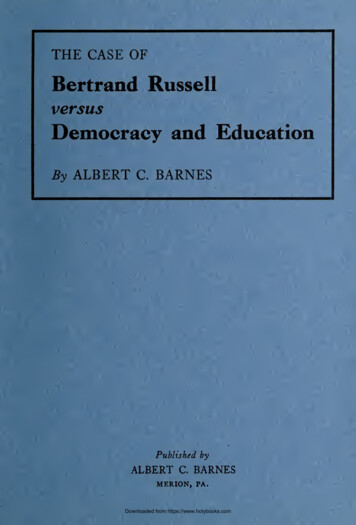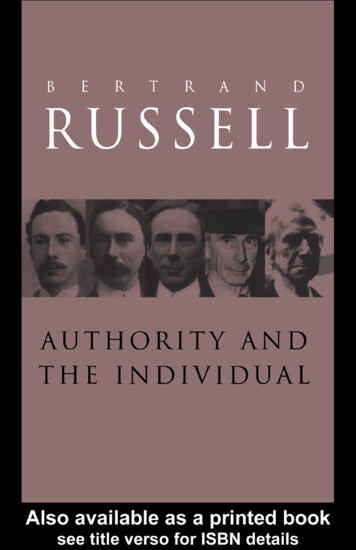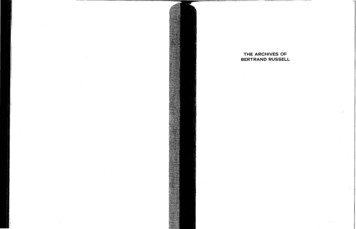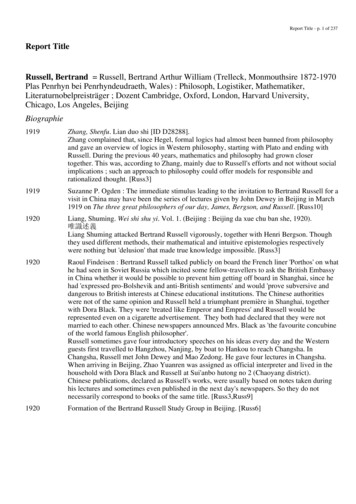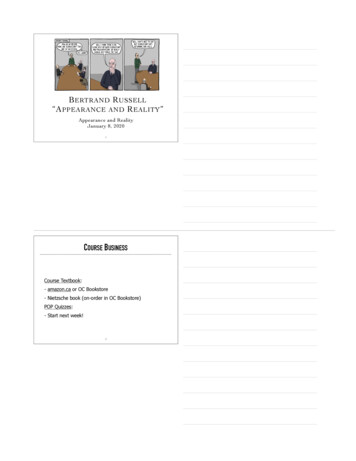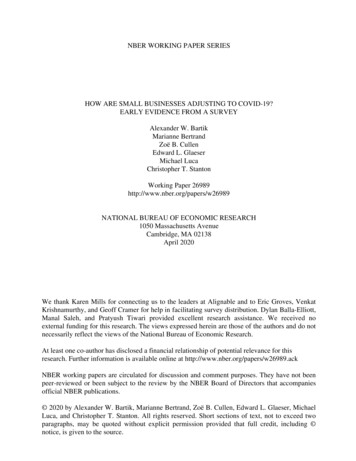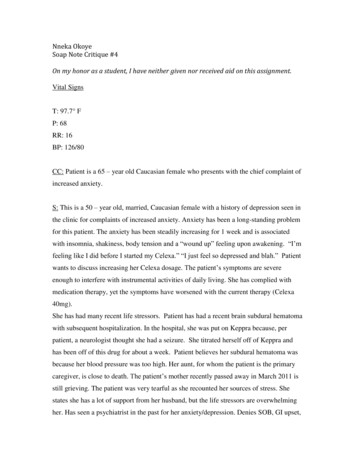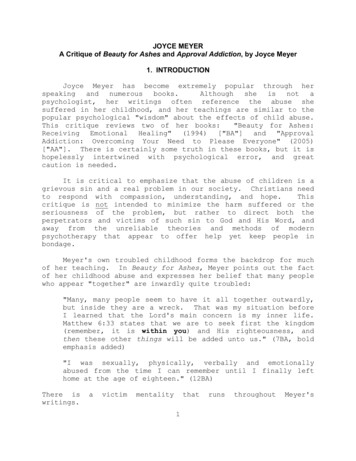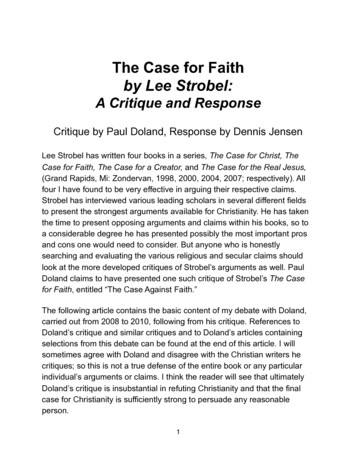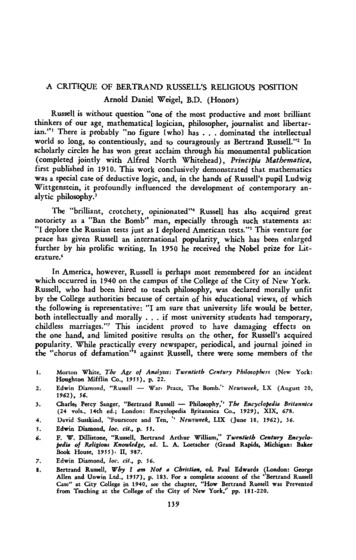
Transcription
A CRITIQUE OF BERTRAND RUSSELL'S RELIGIOUS POSITIONArnold Daniel Weigel, B.D. (Honors)Russell is without question "one of the most productive and most brilliantthinkers of our age, mathematical logician, philosopher, journalist and libertarian. 1 There is probably "no figure [who] has . . . dominated the intellectualworld so long, so contentiously, and so courageously as Bertrand Russell."2 Inscholarly circles he has won great acclaim through his monumental publication(completed jointly with Alfred North Whitehead), Principia Mathematica,first published in 1910. This work conclusively demonstrated that mathematicswas a special case of deductive logic, and, in the hands of Russell's pupil LudwigWittgenstein, it profoundly influenced the development of contemporary analytic philosophy.3The "brilliant, crotchety, opinionated"4 Russell has also acquired greatnotoriety as a "Ban the Bomb'' man, especially through such statements as:"I deplore the Russian tests just as I deplored American tests."5 This venture forpeace has given Russell an international popularity which has been enlargedfurther by his prolific writing. In 1950 he received the Nobel prize for Literature.6In America, however, Russell is perhaps most remembered for an incidentwhich occurred in 1940 on the campus of the College of the City of New York.Russell, who had been hired to teach philosophy, was declared morally unfitby the College authorities because of certain of his educational views, of whichthe following is representative: "I am sure that university life would be better,both intellectually and morally . . . if most university students had temporary,childless marriages."7 This incident proved to have damaging effects onthe one hand, and limited positive results on the other, for Russell's acquiredpopularity. While practically every newspaper, periodical, and journal joined inthe "chorus of defamation"8 against Russell, there were some members of the1.2.3.4.5.6.7.8.Morton White, The Age of Analysts: TwentiethCentury Philosophers (New York:Houghton Mifflin Co., 195 5). p. 22.Edwin Diamond, "Russell — War» Peace, The Bomb.'' Newsweek, LX (August 20,1962), 56.Charles Percy Sanger, "Bertrand Russell — Philosophy/' The EncyclopediaBritannica(24 vols., 14th ed.; London: Encyclopedia Britannica Co., 1929), XIX, 678.David Susskind, ''Fourscore and Ten, '' Newsweek, LIX (June 18, 1962), 36.Edwin Diamond, loc. cit., p. 55.F. W. Dillistone, "Russell, Bertrand Arthur William," Twentieth CenturyEncyclopedia of Religious Knowledge, ed. L. A. Loetscher (Grand Rapids, Michigan: BakerBook House, 1955). II, 987.Edwin Diamond, loc. cit., p. 56.Bertrand Russell, Why I am Not a Christian, ed. Paul Edwards (London: GeorgeAllen and Un win Ltd., 1957), p. 183. For a complete account of the ''Bertrand RussellCase" at City College in 1940, see the chapter, "How Bertrand Russell was Preventedfrom Teaching at the College of the City of New York,'' pp. 181-220.139
140BULLETIN OF T H E EVANGELICAL THEOLOGICALSOCIETYuniversity faculty who sympathized with Russell and who felt that he had been"viciously maligned . . . in large sections of the press."9 As a kind of honorable recompense for this alleged disgraceful treatment of Russell, one of thesympathizers, Paul Edwards by name, edited most of Russell's religious writingsin a book entitled, Bertrand Russell, Why 1 am Not a Christian. It is these religious writings, which display without a doubt a marked "sophisticatednaivete,"10 that will serve as the focal point of this paper.Because of Russell's unequalled fame acquired through his prolific writings and his outspoken words, there is the danger that his religious writings, inwhich he sweepingly rejects all religions, including Christianity will be readuncritically and accepted as the gospel truth. A detailed critique is badly neededin order to prevent students of Russell's religious — or better anti-religious— works from naively accepting him as an authority in the religious field. Inspite of his competence in other areas, it is the present writer's opinion, afterexamining Russell's religious writings, that in the religious sphere he reveals anabysmal lack of competency and proficiency. The present critique,11 thoughrecognizing Russell's great talents and accomplishments, thus aims to subjecthis religious writings to rigorous analysis, in the conviction that in religion asin detection, "the truth will out."RUSSELL'S OBJECTIONS TOCHRISTIANITYRussell's thesis against religion in general is two-pronged, as may be gathered from the Preface which he writes to Edwards* book: Bertrand Russell, Why1 am Not a Christian.9.Ibid., pp. viii - ix.10.Reinhold Niebuhr, "Reason vs. Belief," The New York1957, p. 6.11.N o thorough scholarly critique of Russell's anti-Christian writings has yet beendone. Two such attempts were made in 1928. One was written by H. G. Woods,Why Mr. Bertrand Russell is not Christian(London: Student Christian Movement,1928), and the other by Kenneth Ingram, The Unreasonableness ofAnti-Christianity(London: Published on behalf of the Catholic Literature Association by the Societyof S. S. Peter and Paul, 1928). I have examined both of these books and, have foundthem inadequate. Mr. Woods' book cannot be regarded as definitive for three reasons:(1) It was published in 1928 and Russell has written much on the topic of "antiChristianity*' since then. (2) ï t does little more than quote Russell's arguments againstChristianity; and when the author does occasionally try to refute Russell's position,he operates not from a Christian standpoint but rather from that of humanisticliberal theology. Significantly, he dedicates his book to the influential but avowedlyliberal N e w Testament scholar! of the last generation, F. J. Foakes Jackson, and refersto him as "Magistro meo at amico." (3) A man who in 1928 writes, ''Mr. Russellis not a Christian and so is not bound by it, but Christians ought to do somethingabout it" (p. 54)» and then in 1958 (in spite of Mr. Russell's consistently non-Christianposition during the intervening years) writes an article entitled: "Bertrand Russell,Rationalist and Christian'' {Expository Times, LXIX [February, 1 9 5 8 ] , pp. 132-34), certainly displays aberrational judgment. In this article, Mr. Woods himself admits:' treated the tract [Why I am Not a Christian] rather cavalierly and lightheartedly/'This is, as a matter of fact, an accurate depiction of his critique. The book by Mr.Ingram likewise does not render the present essay superfluous, for ( 1 ) it was alsopublished in 1928 and is now out of print; and ( 2 ) Mr. Ingram presents more a philosophical than a theological critique of Russell's writings.Ttmes Book\ Review,Sept. 22,
WEIGEL: A CRITIQUE OF BERTRAND RUSSELL'S RELIGIOUS POSITIONHIThere has been a rumour in recent years to the effect that I have becomeless opposed to religious orthodoxy than I formerly was. This rumour istotally without foundation. I think all the great religions of the world —Buddhism, Hinduism) Christianity, Islam, and Communism — both untrue and harmful. . . . I am as firmly convinced that religions do harm asI am that they are untrue.12This argument Russell actually reduces to a single "cause-effect" argument,viz., "All the great religions are untrue; therefore, all the great religions areharmful."If this is so, then we might justifiably ask Russell why it is that peoplebelieve in that which is both "untrue and harmful." To this Russell replies:"Most people believe in God because they have been taught from early infancyto do it, and that is the main reason.''13 There is also a second less powerfulreason, which is "the wish for safety, a sort of feeling that there is a big brotherwho will look after you."14These two bases for religious belief, in Russell's opinion, stem from acommon denominator — fear.Religion is based primarily and mainly upon fear. It is partly the terror ofthe unknown, and partly . . . the wish to feel that you have a kind ofelder brother who will stand by you in all your troubles and disputes. Fearis the basis of the whole thing — fear of the mysterious, fear of defeat,fear of death. Fear is the parent of cruelty, and therefore it is no wonderif cruelty and religion have gone hand in hand.15Consequently Russell's basic contention with all religions is that they are basedon a belief that is generated through fear, which in essence is bad; therefore,all religions are "both untrue and harmful."Russell has, morever, certain specific objections to the Christian religion.These objections are of two kinds: "intellectual and moral."16 In stating hiscase against Christianity, Russell says:Therefore, I take it that when I tell you why I am not a Christian I haveto tell you two different things; first, why I do not believe in God and inimmortality; and, secondly, why I do not think that Christ was the bestand wisest of men.17Comprehended in Russell's moral argument is his frequently stated claim thatthe organized Christian Church has been the powerful agent of moral retardation in the world.Russell rejects a belief in God on the basis of an analytic evaluation ofthe Thomistic rational proofs for the existence of God. "You know, of course,12.13.14.15.16.17.Russell, op. cit.á p. xi (italics mine).Ibid., p. 9.Ibid.Ibid., p. 16. Russell maintained the same position in 1954 in "Can Religion Cure OurTroubles/' when he remarked: ''Mankind is in mortal peril, and fear now, as in thepast, is inclining men to seek refuge in God" (ibid., p. 169).Ibid., p. 23.Ibid., p. 2.
142BULLETIN OF THE EVANGELICAL THEOLOGICAL SOCIETYthat the Catholic Church has laid it down as a dogma that the existence ofGod can be proved by the unaided reason."18 Briefly, these arguments may besummariTJed as follows: (1) The causal argument. Every effect has a cause.The world also must have been produced as an effect from a cause, which necessarily must have been the first cause. This "prima causa" must be God. (2) Thenomological argument. The universe operates according to fixed natural laws.Every law presupposes a lawgiver. Therefore, there is a superior lawgiver,namely God. (3) The cosmologie al argument. We observe design and order inthe activity of the universe. This design and order must have some origin. Therefore, God exists as the source and guarantor of this design. (4) The moral argument. Within the universe we observe a gradation of goodness. Consequently,we must presuppose an ens perfectissimum" to account for the gradation ofgoodness in the universe. This "ens perfectissimum" is none other than God.(5) The teleological argument. The universe has a purpose, which is imposedupon it by some higher being. Things are observed to move towards an end, butthey do not have this end within themselves — entelechy — as an inner force.Rather this purposive end is ordered by the supreme mind, which must be God.These traditional Aristotelian arguments do not convince Russell that Godexists. Neither does he claim to be able to prove the non-existence of God.When asked of F. C. Copleston in a radio interview what his position was, hereplied:My position is agnostic. . . . I'm not contending in a dogmatic way thatthere is not a God. What I'm contending is that we don't know that thereis.19Consequently, Russell claims that he cannot believe in God because His existencecannot be proven with absolute certainty.The Christian God may exist; so may the Gods of Olympus, or of ancientEgypt, or of Babylon. But no one of these hypotheses is more probablethan any other: they lie outside the region of even probable knowledge,and therefore there is no reason to consider any of them.20The question of immortality of the soul is another stumblingblock forRussell. He claims that it is a basic Christian tenet to believe in the immortalityof the soul. Yet such a belief he cannot accept because "it is rational to supposethat mental life ceases when bodily life ceases."21 Of course, here Russell isequating "soul" with "mental life." He goes on to argue against a belief in theimmortality of the soul on the grounds that such a belief leads to hyper-individualistic Christian ethics, to a breakdown of the natural biological family tie,18.Ibid., p. 3. Cf. Thomas Aquinas, Basic Writings, ed. Anton C. Pegis (2 vols.; NewYork: Random House» 1945), I. 18-24; and also Richard McKeon, Introduction toAristotle (New York: The Modern Library, 1947), pp. 243- 296.19.Russell, op. cit., pp. 144, 157. **The Existence of God/' a debate btetween BertrandRussell and Father F. C. Copleston, S. J., was originally broadcast in 1948 on theThird Programme of the B.B.C.20.Ibid., p. 40. in "What I Believe," published in 1925.21.Ibid., p. 40. Cf. Bertrand Russell» Religion and Science (New York: Oxford UniversityPress, 1961), pp. 110-143, especially the chapter on "Body and Soul."
WEIGEL: A CRITIQUE OF BERTRAND RUSSELL'S RELIGIOUS POSITION14322and to unwarranted superstition. As for himself, Russell states: "I believe23that when I die I shall rot, and nothing of my ego will survive." The truthof a belief in the immortality of the soul cannot be proven rationally; therefore,Russell cannot subscribe to it.From the standpoint of morality, Russell presents two specific argumentsagainst the Founder of Christianity. He denies that Jesus was the wisest andbest of persons because he miscalculated the time of his return and he spoke ofthe "damnation in hell."I now want to say a few words upon a topic which I often think is notquite sufficiently dealt with by Rationalists, and that is the questionwhether Christ was the best and the wisest of men. It is generally taken24for granted that we should all agree that that was so. I do not myself.For example, Jesus says,"There are some standing here which shall not taste death till the Son ofMan comes into His kingdom," and there are a lot of places where it isquite clear that he believed his second coming would happen during thelifetime of many then living.25Therefore, Russell argues that Jesus (whom Russell, as a matter of fact,doubts ever existed), in advocating that his second coming would be imminent,belied his alleged supernatural wisdom. Moreover, Jesus spoke of "damnationin hell" and of everlasting punishment.There is one very serious defect to my mind in Christ's moral character,and that is that he believed in hell. I do not myself feel that any personwho is really profoundly humane can believe in everlasting punishment. . . I must say that I think all this doctrine, that hell-fire is a punishmentfor sin, is a doctrine of cruelty.26After having rejected both God and Christ, Russell now feels compelledto swing his axe upon the organized Christian Church.You find as you look around the world that every single bit of progressin humane feeling, every improvement in the criminal law, every steptowards the diminution of war, every step towards better treatment of thecoloured races, or every mitigation of slavery, every moral progress thatthere has been in the world, has been consistently opposed by the organizedChurches of the world. I say quite deliberately that the Christian religion,as organized in its Churches, has been and still is the principal enemy ofmoral progress in the world.2722.23.24.25.26.27.See Russell, Why I am Not a Christian, p. 26. Here Russell makes his position patentwhen he says: think it is clear that the net result of all the centuries of Christianity has been ko make men more egotistic, more shut up in themselves, than naturemade them/' Within this context, he further remarks: "This individualism culminatedin the doctrine of the immortality of the individual soul, which was to enjoy hereafter endless bliss or endless woe according to circumstances."Ibid., p. 43.Ibid., pp. 9-10.Ibid.* p. 11.Ibid., pp. 12-13.Ibid., p. l ì (italics mine).
144BULLETIN OF THE EVANGELICAL THEOLOGICAL SOCIETYWhy, in summary, is Russell not a Christian? First, he believes that allreligion is based on fear and thus is bad. Secondly, he cannot on rationalgrounds accept a belief in God or in the immortality of the soul. Thirdly, heis unable to regard Jesus as the wisest and best of men. Lastly, he sees the organized Christian religion as a retardation to moral progress in the world.AN ANALYSIS O F RUSSELL OBJECTIONSLet us now take up in turn each of Russell's arguments against Christianity.Our task will be to evaluate each point objectively in an attempt to discoverjust how valid Russell's anti-Christian arguments are. We shall consider hisabove stated views against the background of the rationalistic humanism whichhe presents as an alternative to the Christian religion.Russell's conviction that all religious belief is a result of fear is a claimthat displays what Randall and Buchler have well termed the "sociologicalfallacy.'*28 This fallacy occurs when people try to establish the origin of something, in this case religious belief, by considering it as it actually functions insociety, and then on the basis of this sociological investigation use the commonelements to evaluate that which has allegedly arisen out of the societal situation.But such an approach is using a descriptive statement as though it were anormative definition. With regard to the distinction between descriptive andnormative definition, E. S. Brightman in An Introduction to 'Philosophyrightly points out:A descriptive definition would state what common elements actually havebeen present in those bodies of experience and belief that have called themselves religious. A normative definition would undertake to tell what religion ought to be. A descriptive definition would be based on a study ofthe facts of religious experience without attempting to pass judgment onthe value of the facts.19Consequently, Russell's assertion that "all religious beliefs are based upon fear"does not actually evaluate belief; it merely describes a condition present in somepeople at the time they come to belief in God. Moreover, fear is not even anecessary condition for belief, as other factors such as desire for happiness, freedom, security — only to mention a few — may be equally as determinative asfear. William James, in The Varieties of Religious Experience, points out that"if there were such a thing as inspiration from a higher realm, it might wellbe that the neurotic temperament would furnish the chief condition of therequisite receptivity."30 Thus origin does not determine value, even if we wereto admit (and there would be no way of proving it) that fear is the sourceof religious conviction. Analogously we may state that most people fear fire,but this says nothing about nor does it determine the value of fire. H. G. Woodssuccinctly notes that psychological reasons "do not explain the origin of . . .28.J. H. Randall, Jr. and Justus Buchler, Philosophy: An Introduction (New York:Barnes and Noble, Inc., 1942), p. 271.29.Edgar S. Brightman, An Introduction to Philosophy (New York: Henry Holt andCompany, 1925), pp. 317-18 (italics mine).30.William James, The Varieties of Religious Experience (London: Longmans, Greenand Co., 1904), p. 25.
WEIGEL: A CRITIQUE OF BERTRAND RUSSELL'S RELIGIOUS POSITION145beliefs. They help to show why men believe. They do not account for what theybelieve."31In opposing the traditional rational proofs of God's existence, Russellis destroying a straw man, not the Christian position. The truth of the matteris that "the modern philosopher can never cogently prove the existence of aGod beyond this world. . . . If human reason tries to transcend the limits of theperceptible world or of mathematics . . . its thinking is bound to get entangledin contradictions . . . . Rational conclusions are dependent on certain premiseswhich reason itself is unable to prove."32A rational proof of God's existence is, moreover, actually inconsistent withthe Christian faith. Blaise Pascal, the French apologist of the seventeenthcentury, has well stated in his Pensées that "the heart has its reasons which reason does not know. . . . It is the heart which experiences God, and notthe reason."33 This is not to say that reason has no place within the Christianreligion; it is, however, to assert that the Christian does not come to a knowledge of his personal God via rationalism. The God which reason can produceis not the personal God of the Holy Scriptures but rather an impersonal Godwhich is Aristotelian and Thomistic.34However, Russell makes the great mistake of assuming that becauseAristotelian Christians have been unsuccessful in proving God's existence, noobjective case for Christianity is possible. In other words, he narrows the meaning of the word "proof" to rational proof. In point of fact, the word "proof"may be employed in at least two other senses: (1) the historical, and (2) thesubjective. These Russell dismisses summarily, though the key to the Christianapologetic lies there. Of the historical, he says:I may say that one is not concerned with the historical question. Historically, it is quite doubtful whether Christ ever existed at all, and if he didwe do not know anything about him, so that I am not concerned with thehistorical question, which is a very difficult one. I am concerned withChrist as he appears in the Gospels.35Of the subjective, he smilingly states:I can speak only from observation, not from personal experience.36Therefore, Russell accepts the Christ-event neither as Historie ("a happeningin the past as an . . . occurrence, which is reported and which is contained in31.32.33.34.3 5.36.Woods, Why Mr. Bertrand Russell is Not a Christian, p. 23.Erich Frank, Philosophical Understanding and Religious Truth (New York: OxfordUniversity Press, 1952), pp. 38-40.Blaise Pascal, Pensées and the Provincial Letters (New York: Modern Library, 1941),p. 95.Aquinas, op. cit., [in n. 18] pp. 18-24.Russell, Why I am Not a Christian, [in n. 8] p. 11. It is precisely because ofRussell's lack of concern for the historical questioni that he can equate Christianitywith "Buddhism, Hinduism, Islam and Communism*' (p. x i ) . For Christianity ''isthe only religion which purports to offer external, objective evidence of its validity.All other religions appeal to inner experience without any means of objective validation*' (John Warwick Montgomery, The Shape of the Past ["History in ChristianPerspective," Vol. I; Ann Arbor, Michigan: Edwards Brothers, Inc., 1962], p. 140).Russell, Whyin 1952.I am Nota Christian,p. 179, in ''Religion and Morals," published
146BULLETIN OF THE EVANGELICAL THEOLOGICALSOCIETYobjective, detached terms"), 3 7 nor as Heilsgeschichte ("a happening in the pastas an event, which is proclaimed and which, instead of being the object of detached observation, comes to one as a personal encounter")?* Yet if Russellwishes to say anything significant about the Jesus presented in the Gospels, hecannot afford to overlook both of these aspects of the New Testamentproclamation.The case for Christianity rests, as the Apostles well knew, on the "objective, historical truth of the resurrection of Jesus Christ from the dead."39 "IfChrist was not raised, then our gospel is null and void, and so is your faith"(I Cor. 15:14). The "Christ of the Gospels" can be no different from the Christof history, for "on the basis of accepted principles of textual and historical analysis, the Gospel records are found to be trustworthy historical documents —primary source evidence for the life of Christ." 40 F. F. Bruce, Rylands Professorof Biblical Criticism and Exegesis in the University of Manchester, points outthat none of the Gospels could have been written later than A. D. 100;thereforej when the Gospels were written, "many were alive who could remember the things that Jesus said and did." 41In these sound historical records, "Jesus exercises divine prerogatives andclaims to be God in human flesh; and he rests his claims on his forthcomingresurrection." 42 In Mark 2:1-12 Jesus forgives sins and in John 10:30 he plainly states: "I and the Father are one." 43 When Jesus in John 2:19 says: "Destroythis temple, and in three days I will raise it up," he is speaking of his body."After his resurrection his disciples recalled what he had said, and they believedthe Scripture and the words that Jesus had spoken."44Russell discounts the supernatural aspects of Jesus' life as recorded in theNew Testament on the ground that miracles are impossible. He says:In former days, miracles happened in answer to prayer: they still do in theCatholic Church, but Protestants have lost this power. However, it ispossible to dispense with miracles, since Providence has decreed that theoperation of natural laws shall produce the best possible results. 45But the fact of the resurrection cannot be eliminated on a priori philosophico37.38.59.40.41.42.43.Robert Scharlemann, ''Shadow on The Tomb,'* Dialog-, A Journal ofTheology*I (Spring, 1962), 23.Ibid., p . 23.Montgomery, op. cit., p. 138.Ibid., pp. 138-39. Cf. F. F. Bruce, The New TestamentDocuments:AreTheyReliable} (5th rev. ed.; London: Inter-Varsity Fellowship, 1960). Also E. J. Barnes,"The Dependability and Value of the Extant Gospel Manuscripts/' in Montgomery»op. cit., pp. 541-57.Bruce, op. cit., p. 13.Montgomery, op. cit., p. 139.44."In Mark 2:1-12 Jesus forgives sins; in such passages as Matt. 11:27; 16:13-17;John 10:30; 12:45; 14:6-10, Jesus states his divine relation to God the Father. It isalso of great significance that the Gospel writers apply to Jesus the ascription Kyrtos("Lord") which in the Greek translation of the Old Testament (the Septuagint) hadbeen used as an equivalent of Adonai and Yahweh, the Hebrew designations for GodHimself" {ibid., p . 168).Ibid., p. 169.45.Russell, Why I am Not a Christian,[in n. 8] p. 42.
WEIGEL: A CRITIQUE OF BERTRAND RUSSELL'S RELIGIOUS POSITION147rational grounds; exceedingly strong historical evidence points in favour ofits having happened, and one must start with this historical evidence, not withpreconceptions. "Miracles are impossible only if one so defines them — butsuch definition rules out proper historical investigation.''46 C. S. Lewis has putit well when he says:Remove miracles from the Bible and you relieve it of all its supportingpillars. The Bible teaches that. . . [the Apostles] saw the resurrected Christ;they ate with Him; they put their hands upon Him and felt Him; theytalked with Him and were instructed by Him. "Then he said to Thomas,Tut your finger here, and see my hands; and put out your hand, and placeit in my side; do not be faithless, but believing/ Thomas answered him,'My Lord and my God' " (John 20:27-28). This is but a typical sampleof the unequivocal manner in which all of the disciples personally andempirically came into contact with the resurrected Christ.47This argument is no proof for the existence of God in the sense of a rationalistic demonstration; "it is an empirical argument based upon the applicationof historical method to an allegedly objective event."48 Certainty can never beattained in historical research. Paul Tillich was quite right when he said withreference to the resurrection: "Historical research can never give more than aprobable answer."49 Yet probability must be utilized by anyone investigatinga factual problem if his research is to have any meaning at all.As we pointed out earlier, forced intellectualization of the Christian faithis completely inconsistent with the nature of Christianity. Therefore, the purpose of this argument is not to force anyone into the Christian religion. It israther to afford a solid objective basis for testing the Christian faith experientially.How is the test made? By confronting, with no more than "suspension ofdisbelief," the Christ of the Scriptures; for "faith comes by hearing andhearing by the word of God" and (said Christ) "whoever has the will todo the will of God shall know whether my teaching comes from God or ismerely my own" [Rom. 10:17; John 7:173. The Scriptural Gospel isultimately self-attesting, but the honest inquirer needs objective groundfor trying it, since there are a welter of conflicting religious options andone can become psychologically jaded through indiscriminate trials ofreligious belief. Only the Christian world-view offers objective ground fortesting it experientially; therefore, Christ deserves to be given first opportunity to make his claims known to the human heart. 50It follows then, that when Russell asserts that there is no basis for belief in theexistence of the Christian God, he takes a position that cannot be squared with46.Montgomery, op. cit., p. 139. Cf. C. S. Lewis, Miracles (New York: Macmillian,1947); and Edward John Carnell, An Introduction to Christian Apologetics; aPhilosophic Defense of the Trinitarian-Theistic Faith (Grand Rapids, Michigan:Eerdmans, 1948), chaps, xiv - xv.47.Lewis, op. cit., p. 246 (italics mine).48.Montgomery, op. cit., p. 139.49.Paul Tillich, Systematic Theology, II (Chicago: University of Chicago Press, 1951), 15 5.50.Montgomery» op. cit., p. 140.
148BULLETIN OF THE EVANGELICAL THEOLOGICAL SOCIETYhistorical evidence. There is a basis: Jesus Christ, who claimed to be God andattested his claim by his resurrection.In criticizing the concept of the "immortality of the soul," Russell commitsthree serious blunders. First, he holds that those who believe in the immortalityof the soul, when they speak of the "soul," refer to a particular aspect of man,namely, the "mental life." Secondly, he presupposes that the Greek idea of theimmortality of the soul is a basic Christian tenet. Thirdly, in rejecting belief inthe immortality of the soul, he attacks a straw man and not the true Christianposition. In general, he mistakenly thinks that immortality is supposed to rest inman himself; and when he finds this notion incredible, he discards immortalityentirely.T. A. Kantonen, in reflecting upon the problem of the immortality of thesoul, correctly observes:The state of man after death has b
Why Mr. Bertrand Russell is not Christian (London: Student Christian Movement, 1928), and the other by Kenneth Ingram, The Unreasonableness of Anti-Christianity (London: Published on behalf of the Catholic Literature Association by the Society of S. S. Peter and Paul, 1928). I have examined both of thes
